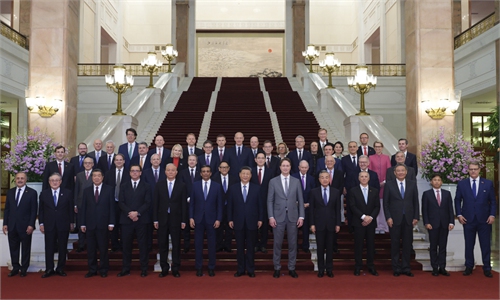Magic AR glasses shine across scenarios
Pragmatic research and policy support fuel innovation in China

On March 1, 2025, in Ningbo, East China's Zhejiang Province, Ubtech humanoid robots undergo multi-scenario, multi-task training at Zeekr's 5G-wired electric car factory, showcasing advanced industrial automation. Photo: VCG
My speech script is right here in my glasses. I can flip pages just by moving the ring on my hand - it's so easy." Recently, at an economic development symposium held in Yuhang district of Hangzhou, East China's Zhejiang Province, Zhu Mingming, founder of Rokid, a Hangzhou-based technology company, showcased a pair of artificial intelligence (AI)-powered smart eye-glasses, once again thrusting augmented reality (AR) into the spotlight.
"With the real-time environment recognition and the combination of virtual and real information overlay function as well as the AI large language models, the AR glasses he wears have already been deployed in sectors including education, health care, energy, and manufacturing," Zhu said, according to Xinhua News Agency.
Over the past 10 years, the company has constantly explored the unknowns, and brought a host of new AR devices to the world. From the conception in the lab, to actual uses in nuclear power plants, space capsules, oil fields and hospitals, Rokid's trajectory of rapid growth represents a vivid example of China's tech enterprises making non-stop progress.
Meeting pragmatic demand
"In AR, the challenge is making cutting-edge technology truly serve sectors like medical care, energy generation and other scenarios would be the major challenge we face. For example, in industries like nuclear power and aerospace, where equipment operations are highly complex and environments are extremely harsh, AR products demonstrate exceptional stability and anti-interference capabilities to function reliably," Xiang Wenjie, co-founder of Rokid, told the Global Times in a recent interview.
In the collaboration with the energy industry, "we encountered a significant challenge -- traditional AR devices cannot operate stably in high-radiation, high-temperature, and high-humidity environments," Xiang said.
For instance, at nuclear power plants, operators must strictly adhere to standardized procedures in operation, while any deviation could compromise the safety of the entire power system, Xiang said, adding that paper-based work orders and conventional video guidance are inefficient that will fail to achieve high-precision monitoring.
To overcome the challenge, Rokid conducted repeated tests on the heat resistance system of optical modules and incorporated industrial-grade protective designing, creating an AR headset capable of withstanding extreme environments. Moreover, "we have conducted on-the-ground research by immersing in users' actual operational scenarios, collaborating closely with frontline workers through participatory observation, in order to leverage AR and AI technologies to enhance operational efficiency," Xiang noted.
The headset is now in use at a nuclear power plant in East China's Fujian Province, assisting workers in achieving paperless monitoring and remote guidance, reducing operational time by 35 percent while increasing work efficiency by 50 percent, Xiang said.
"Faced with the complicated demands in nuclear power, aerospace, and other high-tech fields, the company's persistent investment in research and development epitomizes the innovative spirit of Chinese enterprises in overcoming challenges and driving tech breakthroughs," Wang Peng, an associate research fellow at the Beijing Academy of Social Sciences, told the Global Times.
Instead of mere technological demonstration, Rokid has focused on addressing the practical demands of AR glasses in the specialized fields. Emphasis on the practical application of technology is the key factor enabling Chinese tech companies to gain a competitive edge in global competition, Wang said.
Strong policy support
From conceptualization, prototype designing to actual application and product launch, the process took only four months, Zhu said. "When a new product we have developed urgently needed application scenarios, authorities in Yuhang district would assist us in conducting the first try-out at a local museum. This unexpectedly opened up a new opportunity in cultural heritage digitization."
In 2022, relevant departments of Yuhang learned that Rokid, then still in its start-up phase, was facing research and development cost pressures. The local government promptly proposed an investment of 125 million yuan ($17.3 million) in the company, according to a report by China Media Group.
Rokid was not the only tech enterprise that have benefited from the strong government support to address problems. During the symposium, Han Bicheng, founder and CEO of BrainCo, a neuro-tech company, shared his journey to develop in Hangzhou.
"When brain-computer interface (BCI) technology remained relatively unknown, investment promotion officials from Yuhang flew over 10,000 kilometers to Boston city in the US to help us," Han said.
Han deeply appreciated Yuhang's keen insight into cutting-edge technologies, which ultimately convinced him to relocate the company headquarters to Hangzhou. With substantial support, BrainCo now holds over 220 core patents in BCI technology.
According to Hangzhou Daily, since the beginning of 2025, the city has witnessed over 280 new enterprises on average set up daily, with more than 70 patents granted and nearly 17 million yuan invested in startup companies each day.
"We will refine and develop new structural monetary policy instruments to provide stronger support for scientific and technological innovation… We will nurture dedication to science and strive to create an enabling environment for innovation that encourages exploration and tolerates failure," this year's Government Work Report says.
On March 6, the National Development and Reform Commission, announced that it would establish a national venture capital guidance fund to support innovative enterprises.
Wang said that the pragmatic and dedicated spirit of entrepreneurs, coupled with the government's strong support, has brought new life to the country's innovation cause. "China is building an innovation system that is enterprise-led, market-oriented, and deeply integrated with industry and academia. The formation of this innovation ecosystem will provide a continuous driving force for the country's development," he said.



